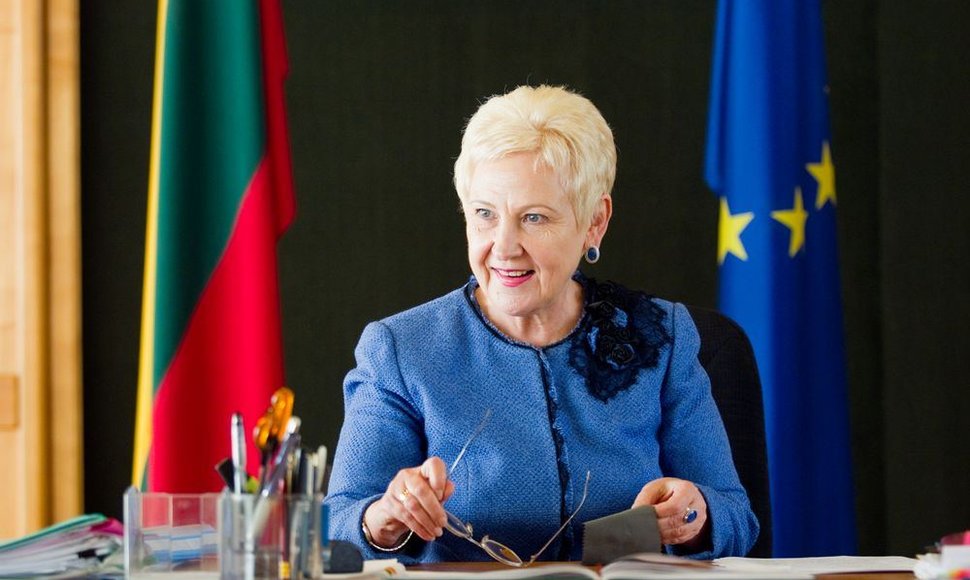- The current Seimas has only weeks left. What are your impressions about it?
- The 2008-2012 parliament was as colourful as life in Lithuania itself. Perhaps, in hindsight, it will be dubbed the anti-crisis parliament. In late autumn of 2008 we had to evaluate the situation very quickly and pass the budget. The bill was put together by the previous government without any thought given to the fact that the crisis had already struck. So we had to make changes, quickly.
Today I can recall the stories about funds for parliamentary work as if they happened in a dream. Perhaps out of sheer ignorance, mostly newcomer politicians used them to buy things that had nothing to do with parliamentary duties. We had to amend the Seimas Statute, describing clearly what could and could not be purchased. We haven't had any problems with that for a year.
We have significantly boosted the parliamentary control – one of the functions of parliament. More attention was given to work in committees and commissions – not only did they discuss new laws but also took part in hearings, spoke to society groups. Almost all committees had to analyse adopted legislation.
We created the History and Commemoration of Parliamentarism Section, established the Independence Grant awarded to young Lithuanian scientists on 11 March. We also established the Freedom Prize to commemorate the 13 January; it was awarded to Russian dissident Sergei Kovalev.
- Do you see any structural and procedural flaws in the way our parliament operates? Under current rules, one MP can easily present a bill for hearing. Perhaps bills could first be submitted to committees to sift out the rational ones?
- When I became the speaker, I set up a working group to prepare a new Seimas Statute.
In Western democracies, you would often see no more than 30 people in plenary halls. Most of the work is done in groups and committees. These send delegates to attend plenary hearings and the entire parliament only assembles to vote. In our parliament, the attendance must be at least half plus one. If we do not have 71 votes (out of 141), a law cannot be passed. MPs must attend both submission and hearings. So perhaps we, too, could learn to work in committees and groups.
- The 2008 election brought to power show business people led by Arūnas Valinskas. This time, the high-profile newcomers are the Path of Courage Party emerging from a street mob action. When are we getting over this fad of ambitious but short-lived assemblies?
- It is all part of a natural process of democratization. Lithuania is no exception in that respect. Mentality in post-Soviet states will change once societies realize there is no magician who can pull a good rabbit out of his hat, only to reveal later that the rabbit is not so good.
Politics is hard work that requires expertise, experience, erudition, information, familiarity with developments in the world. Protests alone cannot change anything.
- Chairing parliamentary meetings you get to listen to a lot of addresses, replies, and questions. Do you think that all your colleagues are qualified to make decision that will affect many lives?
- There are all sorts of people. Each parliamentary group has its Chatty Cathy. Some of them speak reasonably, professionally, present well-argued cases. But there are others who just love the sound of their voices. As Vinnie-the-Pooh once put it rightly, one cannot become known by good deeds. I sometimes see that those who cannot make themselves known for good deeds try drawing attention with gags – and quite successfully at that.
There aren't shows like that in Western parliaments, since there group delegates talk business while work is done in committees and parliamentary groups. But once, during an official visit, I witnessed a fight in the Verkhovna Rada of Ukraine. I was happy that our Seimas was a piece of Heaven on earth when I returned.
- Politicians are not expected to know everything – they have assistants, advisers. However, the case of lobbyist Andrius Romanovskis, who is suspected of buying laws, suggests that many bills are backed by interest groups.
- Lithuania, just like other countries, allows registered lobbyists. It is the government that mostly drafts bills, but some projects are put forward by ministry lawyers. When these are submitted to parliament, the Legal Department reviews them first. There are many lawyers there, I do not think they can all be bought.
If they say that the bill does not violate the Constitution, there are no other flaws, we can include it into the agenda and present it at a hearing. The entire Seimas then votes. How many people must be bought to submit a bill?
Let's say, something has slipped through. It then goes to committee hearings, discussions. The adopted bill is signed into law by the President. If she sees that something is wrong, she rejects the bill and returns to parliament. It might seem at first that drafting a law and having it passed is easy, but it involves a great lot of people. Finally, if we see that a law is flawed, we can always correct and amend it.
- Why no one has corrected the amendments to laws on Excise, Money Laundering and Terrorism Funding Prevention, and Alcohol Control, drafted by your fellow party member Vitas Matuzas who is suspected to have been paid for presenting them?
- I could not say if anyone has already registered draft amendments. But all these laws have been signed by the President.
- Every parliamentary election returns a crop of inexperienced political rookies. But where can one learn to do big politics?
- Lithuania has only been independent for 22 years. All politicians in 1990 and later came from the street. I would not venture to call the Lithuanian Communist Party members big politicians. There were people of various professions and all were self-taught. At first, it was complicated and many mistakes were made. But Lithuania still managed to achieve much over the last 22 years with its self-taught politicians. We try to draw practical knowledge from older democracies. Sometimes people say that MPs are “touring” when they go to other countries. In fact, they go there to learn.
We like to say in Lithuania that we need new faces. But there must be a symbiosis of the older generation and young newcomers. It would be a mistake to have only youths in politics. The average age of MPs in many Western democracies is over 50 years. Politics requires life experience, wisdom. Democracy is order, not anarchy. Older people have more life experience, are more tolerant towards differing opinions, readier to look for compromise.
That does not prevent new people from entering politics. We were young once too. The first cabinet contained very young ministers, the current one also has young people. Every term brings a new wave of young, educated, well-read politicians.
In the beginning, we did not have political science programmes and now they are taught in two universities. Not to mention people going to study abroad and then returning to go into public service.
- Polls suggest that many people would like to see you leading the Government, not parliament. Would you agree to do that?
- I would not wish to rush ahead of things. That is something for voters to decide. I do not even want to speculate about that now.













